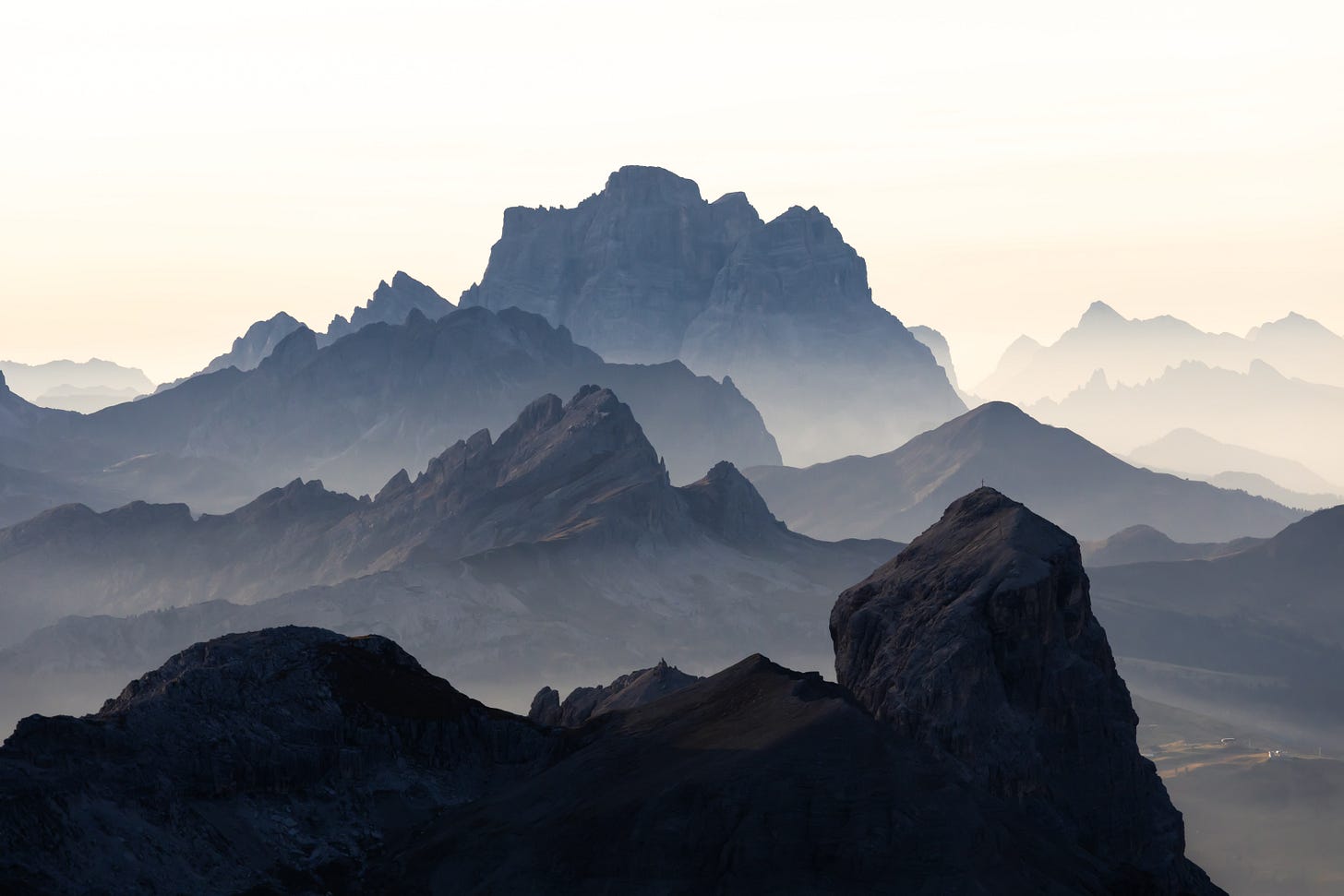
to 2020,
I refuse to consider 2020 as anything but another year filled with beauty and tragedy.
It was a year where political ineptitude and societal upheaval resulted in the suffering of people we loved.
It was a year where there was far more unity and solidarity than you’d be led to believe based on the perceived divide.
It was a year where we had no choice but to love others and do what we could, including making sacrifices, for the betterment of everybody. It was a year where we were forced, as we always are, to recognize how we can’t do this life thing alone.
There is no such thing as rugged individualism and I challenge you to reconcile with how your successes are not yours alone. This is not a negative thing; instead, it’s a beautiful testament to how we need each other and others need us.
I want to look at 2020 and bury this godforsaken year in the past and consider it an anomaly but that would be irresponsible and unfounded in reality. It is possible (maybe even likely) we will deal with pandemics in the future, hurricanes and wildfires will continue to worsen due to the continued heating of the climate, science and medical disinformation and misinformation will continue to spread, ineffectual political leaders will continue to sow discord and hate among us. And we will inevitably face more tragedies that impact the majority of us.
We have two paths: Rugged individualism or compassionate collectivism. Truthfully, only one path really exists. Rugged individualism only exists in one way and that’s if you choose to go off the grid and stop interacting with society altogether, and even then you’d be impacted by how massive corporations negatively alter the climate. Compassionate collectivism is the recognition that we cannot live entirely alone when we constantly interact and engage with others. Rugged individualism did not work at the beginning of the pandemic; “I don’t want to wear a mask since it’s my personal choice but I’m not stopping you from wearing one” was not an appropriate comment to make as we had no idea if the person refusing to wear a mask was potentially infected with the virus and shedding it, thus putting others in harm’s (or worse, death’s) way. Those actions impacted others since they were choosing to go out in public (while using public roads and other community resources all the meanwhile) while being inconsiderate of others who were simply asking them to wear a small piece of cloth over their mouths.
Therein lies many issues; how can we promote this concept of compassionate collectivism when our leaders who have the ability to repurpose or adjust society for a bit to accommodate all of us? With so many conflicting guidelines / lockdowns / policies going around (including an early baseless claim by the CDC that masks were not effective in reducing spread), it’s hard to be frustrated with anybody reacting to their material circumstances. We should be more frustrated when the powerful don’t do what they must do to protect us. There were lots of people who were pissed off and felt their freedoms were being infringed upon by enforced mask mandates; people were claiming that this was a violation of their constitutionally-ordained rights. My point of contention with this logic is that, since there was no surefire way to know whether or not somebody had been infected, mandates were critical as a way to take an easy precaution to reduce spread, while also ensuring a sense of community; masks became almost a symbol to their fellow human that they were cognizant of the implications. If you have an issue with mask mandates which are in place to prevent you from spreading the virus, then surely you have an issue with smoking bans, shirts and shoes being required in businesses, and laws against drunk driving? What all of these have in common is the responsibility we have to the others that occupy our space alongside us. Your decision to smoke in public is not solely your decision; it is your decision that impacts others. This is true of wearing a mask; it’s hard to truly know beyond a shadow of a doubt whether or not you have COVID, so wearing a mask and simple hygiene practices are the bare minimum you can do to try to prevent spreading this dangerous virus.
Rugged individualism is rooted in something good — A desire for all of us to take responsibility for our actions — that gets manipulated into something not so good — the lack of accountability for those who want to put themselves at risk without concerning themselves with how their risk harms others. “Taking your chances” is different from “Taking your chances, getting sick, and then getting others sick because of your callous risk-taking.” This is where rugged individualism falls flat and ultimately, ceases to exist. We breathe the same air as one another, meaning it’s just about impossible to get anywhere entirely on one’s own.

Every year I write an essay like this to cap off the year. Usually, I reflect back on my year and draw some conclusions about what I personally learned. This year flew by like all others but the lessons I learned about myself were more instrumental than any other. Personally, I learned to love myself and love others on a deeper level. I now refuse to talk down to myself in a demeaning way; instead, I opt for a compassionate, understanding, growth-oriented approach. Simply talking to myself differently made me stop hating myself. If I had continued the way I had been, I can almost assuredly say that I’d not be seeing 2021. My eyes well up at the thought of how much I used to despise myself. How could anybody ever learn to love me or believe I loved them if I looked at myself in the mirror with the deepest of resentments? There was no sustainable future for me.
What saved my life was recognizing how others saw me differently than I saw myself. Others loved me despite my know-it-all, doesn’t-shut-the-hell-up, loud personality. Others believed in me when I didn’t believe in myself. Others were there for me when I grieved my sister and blamed myself in ways they probably never knew. Simply, others were there for me. Strangers were there for me when they never knew they were, changing the trajectory of my week by buying my coffee as a kind gesture; friends I hadn’t talked to in a long time sparked joy in my soul by simply sending me a message with any degree of compassion or solidarity.
To put it as plainly as possible, if I had stuck with the belief in rugged individualism, I would have ended my own life out of a misplaced sense of responsibility. I had learned to rationalize the darkest impulses and thoughts about myself and my life. To whoever is reading this, it’s possible that you helped save my life even by commenting something nice on my essays.
2020 was a miserable fucking year for a lot of people. I won’t pretend that we won’t look back at this year for decades to come and reflect on how it seemed like just about anything that could go wrong, did. I won’t pretend it wasn’t miserable. There was a day in November when my parents’ COVID symptoms were worsening and I had to take them to the ER. I drove there in sheer terror, struggling to form words but also trying to remain calm so they did not realize how worried I was. I thought about all the families that have lost loved ones to COVID and the fear they probably felt knowing the symptoms were worsening. I thought about the Zoom funerals or the FaceTime calls families had with their dying loved ones in the ICU. I thought about the healthcare workers that have literally put their lives on hold and on the line to fight this virus. I worried that my final moments with my parents could very well be watching them walk into an emergency room hundreds of miles from all of our loved ones. At that moment, the lesson I am coming out of this year having internalized crystallized in front of my eyes.
We are not alone in this life. We never are. There will always, always, always be somebody there for us that wants to love and support us. In some cases, they’re strangers providing us treatment for a virus; in other cases, they are our family and friends; in even some cases, they are that stranger who buys our coffee for whatever reason, thus sparking a moment of brief joy in our hearts; it is also our dogs wagging their tails whenever we get home from work no matter how bad of a day we had. We are not alone and we never are, despite how horribly and painfully alone we feel sometimes.
In 2020, I left two of the foundational pillars of my life. I left my job as a CF researcher at Cincinnati Children’s after nearly 4 years and I left Northern Kentucky after having spent most of my life near there. I left two places where I had felt the most comfortable for opportunities that I desperately hoped would restore my optimism and excitement about life. They were risks that I had to take. I needed the challenge, the spark, the opportunity. I was fortunate in 2020 that these risks panned out for me.
I was heartbroken to leave my research job and Northern Kentucky. Together, the people at work and my loved ones in Kentucky have seen every version and side of Tré. They have seen me at my worst and at my best, and they’ve been there every step of the way. Many times, they’ve been there by kicking my ass and being tough on me, knowing I could be better than I was being. I’ve needed that. Other times, they’ve listened to me vent and told me they loved me. I have hated myself so much that I decided there was no more good to be had by hating myself; other people could help me be better, but hating myself was helping nobody. I have never once accomplished something completely and entirely on my own. None of us ever have. We can still be successful, but that also means we can be instrumental for others’ accomplishments.
As you probably know, I adore Bernie Sanders and his principled conviction to fight for a better world no matter who it makes feel uncomfortable. One of his campaign slogans was: ”Not me, Us.” In the same vein, this essay is not about me; it’s about you, it’s about us. It’s about the better world that we can bring to reality through fighting for what’s right and retaining our core compassionate every step of the way. It’s about how we must be there for others because others must be there for us.
I wrote last week how it’s hard not to feel like the COVID-19 vaccines are perhaps the greatest achievements in human history (perhaps a hair too hyperbolic but not much). Through this dumpster fire of a year, there was solidarity unlike anything ever seen behind the scenes; scientists and health care personnel across the globe repurposed their labs to combat this new strain of coronavirus with the express purpose of ending this war abruptly. There was global collaboration no matter political differences or diplomatic concerns, because, to be vulgar, a virus does not give a single fuck about your political perspective. There is a tragic beauty in knowing that scientists and health care personnel across the world were constantly criticized and undermined every single day for a year and they continued the fight because they knew it wouldn’t matter in the end; they put their heads down and committed to the fight not as individuals but as a collective force against an inanimate invisible virus that brought the world to its knees. 2020 is over, and while COVID is not yet, there is a light at the end of the tunnel.
This essay is about what we all can leave 2020 having learned just how much we need each other and others need us. There is no future for any of us if we refuse to believe that our actions impact others. There is no world without solidarity.
No matter how your 2020 went, I hope you’re gentle on yourself. I hope you find that unconditional love for yourself that your animals have for you. I hope you take the time out of your day to do one kind thing for yourself and one kind thing for a stranger. It can be small or grandiose, but it will never be useless.
We had no control over what this world looked like when we came into it, but I can’t think of anything more beautiful than trying to leave it a bit better than we found it.
That’s how I’m choosing to leave 2020. I don’t have it in me anymore to be resentful, angry, or nihilistic. It takes a lot to combat our worst impulses, but just know: You’re never alone in the fight.



Thanks for this wonderful, thoughtful piece - just what I needed to read. All good wishes from England for the year ahead.